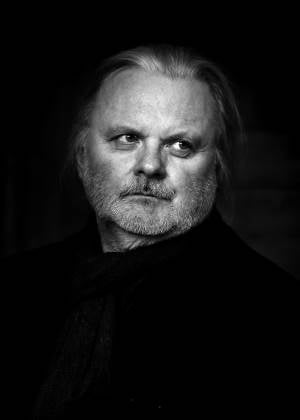
Jon Fosse
- Germany, Norway
- Zu Gast beim ilb: 2008
Jon Fosse was born in Haugesund on the Norwegian coast in 1959. As a teenager, the son of a shopkeeper was particularly devoted to music, which he then gave up in favour of literature. He studied Comparative Literature in Bergen before working as a tutor at the Academy for Creative Writing in Hordaland. He became well-known in Scandinavia following the publication of his early novels. After he had written a play commissioned by the Bergen Theatre in 1992, »Nokon kjem til å komme« (Eng. »Someone is Going to Come«), he penned many further prize winning dramas in quick succession. Since Thomas Ostermaier’s German language production of »Namnet« (Eng. »The Name«) at the Salzburg Festival in 2000, if not before, Fosse has counted among the dramatists whose works are most frequently staged internationally. In 2001 there were around 150 premieres of his plays.
Alongside novels and plays Fosse has also published collections of essays and poems, and children’s books. His works are characterised by poetic minimalism and musicality of language and thus have been compared to Samuel Beckett and Thomas Bernhard again and again. The protagonists, usually nameless, are difficult to place in a social or psychological sense and encounter life and death, as well as uneventful everyday existence, as outsiders, and respond hesitantly and insecurely through simple, inadequate speech. Their dialogues and streams of consciousness are made up of sparse fragments of communication yet – by dint of repetition, pauses and variation – set up a unique tone that does not let go of the reader or the audience. Because every experience is described and sensed from a distance, happiness and unhappiness hang in the balance for protagonists and recipients alike. In the light of immutable human vulnerability it does not make a great deal of difference whether a young couple break up over the naming of their child (as in »Nammet«) or – as in »Barnet« (Eng. »The Child«) – stay together, although – or because – their child will be stillborn.
In his more recent works Fosse has progressively freed himself from chronological constraints. His latest novel, »Morgon og kveld« (2000; t: Morning and evening), begins with the death of an old fisherman, throwing light on different episodes in his life. In the narrative »Det er Ales« (2004; t: That is Ales), the memory of a dying woman reaches back to her great grandmother, always circling around a leitmotif: the disappearance of her partner.
Fosse’s work has been translated into over forty languages. The awards he has received include the Ibsen Prize, the Nestroy Theatre Prize, the Scandinavian National Theatre Prize – which the author has won twice, as with the Melsom Prize –, the German Jugendliteraturpreis, the Honorary Prize of the Norwegian Cultural Council and a lifelong scholarship from the Norwegian state. The author is Chevalier de l’Ordre National du Mérite. He lives with his family in Bergen.
© international literature festival berlin
Der Name
Rowohlt
Reinbek, 1997
[Ü: Hinrich Schmidt-Henkel]
Das Kind
Rowohlt
Reinbek, 1998
[Ü: Hinrich Schmidt-Henkel]
Da kommt noch wer
Rowohlt
Reinbek, 2000
[Ü: Hinrich Schmidt-Henkel]
Melancholie
Kindler
Berlin, 2001
[Ü: Hinrich Schmidt-Henkel]
Morgen und Abend
Fest
Berlin, 2001
[Ü: Hinrich Schmidt-Henkel]
Traum im Herbst und andere Stücke
Rowohlt
Reinbek, 2001
[Ü: Hinrich Schmidt-Henkel]
Das ist Alise
Mare
Hamburg, 2003
[Ü: Hinrich Schmidt-Henkel]
Schwester
Bajazzo
Zürich, 2006
[Ü: Hinrich Schmidt-Henkel]
[Ill: Aljoscha Blau]
Übersetzer: Hinrich Schmidt-Henkel
